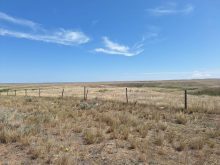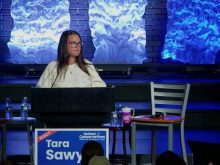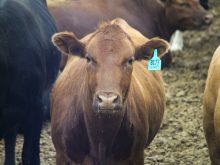Directors of the Alberta Wheat Commission say its first annual meeting a the end of January was an occasion for celebration, but now it’s time for work to begin.
The AWC is the first provincial wheat commission in Canada, and has been operational since Aug. 1, 2012. It aims to represent the 11,000 wheat growers in the province, and co-chair Kent Erickson says it is a time of opportunity. He acknowledged the different climate created by end of the Canadian Wheat Board single desk.
“Our industry in some areas such as research, public funding, varietal protection rights and future investment, is in a state of change. I don’t think that the industry, which includes producers, has let it turn into chaos,” he said.
Read Also

Farming Smarter receives financial boost from Alberta government for potato research
Farming Smarter near Lethbridge got a boost to its research equipment, thanks to the Alberta government’s increase in funding for research associations.
“There are always leaders in our agricultural industry that take the first step and lead us in a new direction. That is what I hope our organization will do in the future,” he said.
Fellow co-chair Lynn Jacobson outlined the group’s strategies.
“One of the things we’re really looking at now is public research dollars and what has been happening to them. We all know that the federal government has been pulling back on funding some of the programs and research stations, and has not been replacing research scientists,” said Jacobson.
The AWC has started to investigate how private investment can fill the gap left by the decline in public funding for research, but has yet to make a decision about which avenue to pursue.
“In my own opinion, I don’t want to let public research dollars go down too far. I still think there is public good in all this research and the public does benefit a lot from what we do, so they should have a stake in our industry,” said Jacobson. He said the AWC should fight to maintain government investment at both federal and provincial levels.
The new commission is expecting to make investments in agronomics, plant and genetic development, plant registration and a new model for plant breeding.
“With the new model, we’ll also be looking at the possibility of end-point royalties, what this will mean to our members and if they want to do it,” said Jacobson. “It’s got to be a discussion within our industry.”
Checkoff funding
The AWC has to decide how to fund the Western Canadian Grains Research Foundation and the Canadian International Grains Institute. The AWC will be meeting with both organizations and has to make a funding decision within the next five years.
“My fear as a director and as a wheat farmer in Alberta is that when you’re looking at your wheat checks right now, there are a lot of checkoff lines in there and what will people feel about that?” asked Jacobson.
The AWC has been invited to join a working group regarding a cereals council, and they will use this opportunity to investigate the merits of this group for future collaboration between all sectors of the wheat industry. The board will also try to build good relationships with all three levels of governments, and has received advice from other groups such as the Alberta Barley Commission, the Alberta Canola Producers Commission and the Grain Growers of Canada.
The board created a strategic business plan and has launched a producer engagement campaign to reach out to producers at crop and industry events. They’ve also assembled a board of 11 directors and 15 regional representatives and have employed two staff people.
General manager Rick Istead said the group is still going through regulatory issues to become legislated.
“We are Canada’s first all-wheat provincial producer commission and with that comes certain roles and responsibilities that we need to live up to. One of them is leadership, leadership not only within Alberta, but also leadership across the industry,” he said.
Priorities are improving producer and farmer returns on wheat and as well as a focus on research.
“We need to invest in this crop. We need a wheat-innovation strategy to move this industry forward,” he said.
The Alberta Wheat Commission will be sharing space with the Alberta Barley Commission and is currently looking for real estate for a shared office in Calgary.
Saskatchewan expects to have a wheat commission operational by August 2013. Manitoba’s wheat commission is still in the planning stages.















